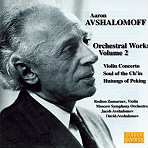Aaron Avshalomoff is one of the very rare examples of Western-composer-gone-East. Born in Siberia, he spent nearly 30 years of his life in China, where, along with symphonic music based on local scales and folk melodies, he also managed to write operas in the traditional Chinese style. Despite a somewhat diluted style, the Violin Concerto in D major (1937) sounds like an idyllic musical postcard. The folk material is used in a very direct and simple way, and the work brings out an intense feeling of serenity. Though an early composition, the ballet-pantomime Soul of Ch’in is at once more ambitious and successful. Here, flashy orchestral colors and lively rhythms create a buoyant atmosphere akin to Stravinsky’s Chant du Rossignol, with the final “Death of Kinsei” adding a touch of melancholy. First performed by Stokowski in 1935, the picturesque tone-poem Hutungs of Peking once again shows Avshalomoff’s ability to combine brilliantly Western writing with folk material. The composer’s son Jacob and grandson David are working hand in hand for the rediscovery of his colorful music, and they competently share the baton in this program. The expressive violinist Rodion Zamuruev certainly helps the concerto to avoid tediousness, while the Moscow Symphony Orchestra plays with its usual professionalism.
































